North Korea

IN THESE UNCERTAIN times, I look for witnesses who will guide me to a more hopeful future. I do so because I cannot overcome my anxieties alone. I recognize the affective, spiritual, and communal dimensions of healing and recovery. When we heal and witness together, we are emboldened to witness the life-giving hope of the divine with the other more than ever.
In this month’s reflections, I see various sources of hope and witnessing. Beyond anthropocentrism, I see that nonhumans, particularly jackals and ostriches, are guiding us in our relationality with the divine and others (Isaiah 43:16-21). In responding to trauma, I seek the wisdom of women (“daughters of Jerusalem”) who have been down this road before (Luke 23:27-31). With their guidance, I hope for a peaceable kingdom that is unmitigated by false hopes and spiritual bypassing.
My last reflection engages Thomas the Twin (John 20:19-31) and the inauguration of Donald Trump for a second time. Here, I offer a weary posture of the discombobulated mind that is still trying to grasp the impact of his inauguration. I am trying to breathe amid a sense of despair. So, I hope that you will breathe as well, say a prayer or two, talk with a trusted friend, be with your animal companion, and relish your personal solitude. In all ways, I hope that you will find hope as you witness and become witnesses of social holiness.
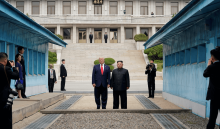
Today, the space to negotiate peace on the peninsula remains accessible as both Koreas and the United States are not only aiming for peace and denuclearization, but on genuine economic cooperation.
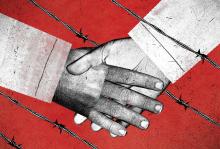
N ANY DEEP national division, political peace is critical. The absence of a formal peace treaty between North Korea and South Korea and the U.S. is an enormous barrier to a new future. Yet easily overlooked is that lasting peace also requires decades-long work of people-to-people engagement.
Novelist Chimamanda Ngozi Adichie has spoken of “the danger of a single story.” In few places is that danger more real than between North Koreans and Americans who are profoundly misinformed about each other after 70 years of mutual isolation.

CHRISTIANITY IS THE ONLY religion in North Korea that is considered to be strictly a foreign religion. North Korea considers Christianity to be the forefront of American imperialism. The country is taught that Christian missionaries in the 19th century came to Korea to indoctrinate the people with Western civilization. Then, in the Korean War, the U.S. soldiers who massacred their people were depicted as Christian crusaders. To fan these flames, the largest group of Koreans who opposed communism when the government was established in 1945 was the Christians. Therefore, in North Korea, Christians are likened to spies, foreign imperialists, and anti-government traitors.
Despite this, Christianity has been allowed to persist in North Korea. The vast majority of churches were destroyed during the early years of communism in North Korea, but in 1989 Kim Il Sung brought life back to Christianity by rebuilding the home church of his mother. Since then, two other state churches have been erected: one additional Protestant church and one Catholic church.

TWO-THIRDS OF A CENTURY after the Korean War, most Americans do not know what happened in that conflict or how it impacts the Korean Peninsula even today.
In 1950, North Korea invaded South Korea. The U.N. intervened, and in the three years that followed the U.S. Air Force dropped more tonnage of bombs on North Korea than were used in the entire Pacific theater during World War II, including more than 30,000 tons of napalm. The U.S. destroyed 80 percent of the North’s infrastructure and 50 percent of its cities. The capital city of Pyongyang was wiped off the map.
“Over a period of three years or so, we killed off—what—20 percent of the population,” said Air Force Gen. Curtis LeMay, head of the Strategic Air Command during the Korean War. Historians believe that between 70 and 80 percent of the deaths were civilians.
Nearly 40,000 U.S. soldiers died and more than 100,000 were wounded in what has been a “forgotten war” in the United States. North Koreans, however, have never forgotten the war that resulted in millions of casualties in their country. For 65 years, they have lived under that war’s vivid memory and evolved into one of the most militarized states in the world.
The root causes of the problem
Technically, the Korean War never ended. The armistice treaty signed in 1953 reinstated the government of South Korea, suspended open hostilities, created the Demilitarized Zone, and allowed for the release of prisoners of war, but it was not a permanent peace treaty between nations. No peace treaty has ever been signed. “We have won an armistice on a single battleground—not peace in the world. We may not now relax our guard nor cease our quest,” said President Dwight Eisenhower.

Like Torrey, Korean Christians who support reunification see it as a political and religious goal. And although it’s an uphill struggle, they believe with faith anything is possible.

The historic meeting was set for June 12 in Singapore, but was cancelled by Trump this month. The U.S. approach to this meeting was concerning. Trump felt that the U.S. did not have to do anything to prepare for the June meeting. He continues to keep a military presence in South Korea with joint U.S. and South Korean military exercises that have always been a threat and irritation to North Korea. The mere presence of 25,000 U.S. Troops in South Korea heightens the suspicions and anxieties of Kim Jong un and the North Korean people. Trump has become blind to the need for diplomacy.

Even though many view this summit with cynicism, it is an important step towards any possibility of peace on the Korean peninsula. The summit was historic because Kim Jong-un and Moon Jae-in met for the first time and agreed to end the Korean War. They also agreed on the Panmunjom declaration which seeks a denuclearization of the peninsula. Russia, China and Japan have also welcomed the agreement.

Moon greeted Kim at the military demarcation line where the men smiled and shook hands. In an unplanned move, Kim invited Moon to step briefly across into North Korea, before the two leaders crossed back into South Korea holding hands.

Lawmakers from North and South Korea are reported to be negotiating the details of a joint statement that could outline an end to the 1950-1953 Korean conflict that ended in a truce, not a peace treaty.
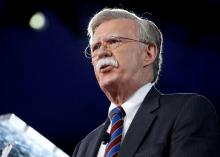
John Bolton is a menace, a “warmongering lunatic” writes Damon Linker, “a dangerous uber-hawk” in the words of former national security officials Colin Kahl and Jon Wolfsthal. Throughout his career, Bolton has been a consistent advocate for war as an instrument of national policy. He opposes the Iran nuclear deal and dismisses the value of negotiating with North Korea, urging instead the use of military strikes and the policy of regime change.
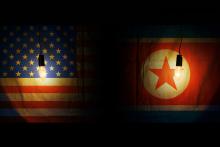
As Trump and Kim Jong-un approach possible conversations, here are 3 truths for American Christians to keep in mind.
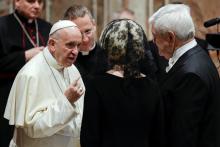
"Nuclear weapons must be banned," Francis said, quoting a document issued by Pope John XXIII at the height of the Cold War and adding that there is "no denying that the conflagration could be started by some chance and unforeseen circumstance".

NORTH KOREA'S hydrogen bomb test in September came as no shock to observers in South Korea. It was timed to protest the annual joint U.S.-South Korea military exercises. These “war games” are viewed by North Korea as a deadly provocation and as preparation for invasion and regime change.
The saber rattling and war of words by the U.S. and North Korean administrations reached a dangerous level this fall when President Trump, in his address to the U.N. General Assembly, threatened to “totally destroy” North Korea. To use such bellicose rhetoric at a forum that seeks political solutions to the world’s problems was particularly grave and reprehensible. It flies in the face of Christian values as well as the principles of universal human rights on which the U.N. is founded.
In September, U.S. planes crossed the demarcation that separates North and South Korea in the East Sea. In response, North Korea’s foreign minister, Ri Yong-ho, issued counterthreats to shoot down U.S. strategic bombers. Ri’s remarks betray North Korea’s fears of a pre-emptive strike by the U.S. and the “decapitation” of North Korea’s leadership. Since then the situation has gotten worse.
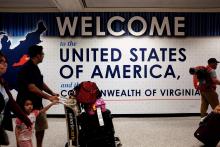
The current ban, enacted in March, was set to expire on Sunday evening. The new restrictions are slated to take effect on Oct. 18 and resulted from a review after Trump's original travel bans sparked international outrage and legal challenges.
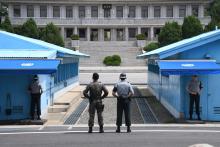
Two realities here in South Korea seem unknown or underappreciated in the U.S. First is the fact that the Korean War has not ended. There’s no treaty, and no permanently recognized peace — only an agreement 60 years ago to cease actual hostilities.
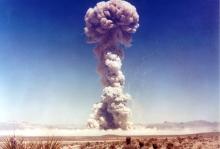
"It always requires two people, two separate actions, to launch, steal, sabotage, or tinker with an atomic warhead," Peter Zimmerman, nuclear physicist and State Department consultant wrote for USA Today. "This is the inviolable two-person rule intended to prevent misuse of a nuclear weapon."

Aug. 9 is a good day to remember that the United States stands alone in the fire and fury we have brought to the world. There is only one nation that has used a nuclear bomb on people — the United States, and we did it twice in one week. The United States dropped the "Little Boy" bomb on Hiroshima on Aug. 6, 1945; three days later we dropped the "Fat Man" bomb on Nagasaki. More than 100,000 died instantly that week, and tens of thousands more in the weeks to follow.

The point is not that North Korea should be given free-reign by the international community to develop any and all weapons that it so chooses. But Gollwitzer would have American Christians remember that they are called to be a political influence in the service of peace. For Gollwitzer, you can tell whether Christians have understood the gospel by whether they reject war under nuclear conditions: “the ‘Yes’ to the Gospel and the ‘No’ to war today must go together — or both will be lost” (Demands of Freedom, p. 136.).

OF THE MORE than 60 countries I have visited as a journalist, North Korea is by far the strangest.
As part of a five-person delegation from the Presbyterian Church (U.S.A.), I visited North Korea for one week in spring 2010 at the invitation of the Korean Christian Federation, the government-sanctioned Protestant denomination in North Korea.
From the moment we touched down in Pyongyang, we were “minded” 18 hours a day by two leaders of the KCF. We saw only what they wanted us to see and spoke only with those who were part of our official itinerary. North Koreans are forbidden to speak—or even make eye contact—with foreign visitors.
One morning before our minders showed up, I went for a short walk with another delegation member. I carried my camera and took a few photos. When we returned to the hotel, our minders were waiting for us in the lobby with several government officials. I was instructed to scroll through all my photos and was told which ones I could keep and which were to be erased on the spot.